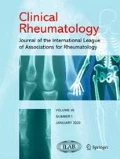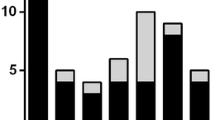Abstract:
The aim of this study was to compare ELISA, immunodiffusion and immunoblot for the detection of anti-Jo-1 antibodies, and to investigate the association of the results with clinical manifestations. In two medical centres for rheumatology and one for pulmonology, all patients with suspected connective tissue disease were screened over a 5-year period for anti-Jo-1 antibodies by ELISA. Positive sera were controlled in another laboratory by immunodiffusion. If immunodiffusion was negative, sera were controlled again by ELISA. ELISA-positive immunodiffusion-negative sera were tested by immunoblotting. The patients were characterised clinically, and their clinical signs and symptoms were compared with those of 257 patients with anti-Jo-1 antibodies published in 15 case series and 30 case reports. Twenty-five patients had a positive ELISA test. Fifteen sera were positive by ELISA and immunodiffusion (group 1). Three sera showed high titres in both ELISA tests with negative immunodiffusion and immunoblot (group 2). Seven sera showed low titres in both ELISA tests. The results were negative in the other tests (group 3). Patients in groups 1 and 2 could be classified as Jo-1 syndrome patients. Of these 18 patients, 15 had arthritis, 14 had myositis and 14 had interstitial lung disease. Only four patients had myositis at disease onset. We describe four unusual patients with Jo-1 syndrome in detail: 1. Long history of seronegative rheumatoid arthritis; 2. Sjo¨gren’s syndrome with Ro- and La-antibodies; 3. Scleroderma and bronchial carcinoma with centromere antibodies; 4. Corticoid-sensitive psychosis. Patients with suspected connective tissue disease may be screened for anti-Jo-1 antibodies by ELISA. It detects some patients that are missed by immunodiffusion. Especially lower ELISA titres should be controlled by another method because of the low specificity of the test. The clinical picture is variable. Most patients have features other than myositis at disease onset.
Similar content being viewed by others
Author information
Authors and Affiliations
Additional information
Received: 19 July 1999 / Accepted: 10 December 1999
Rights and permissions
About this article
Cite this article
Schmidt, W., Wetzel, W., Friedländer, R. et al. Clinical and Serological Aspects of Patients with Anti-Jo-1 Antibodies – an Evolving Spectrum of Disease Manifestations. Clin Rheumatol 19, 371–377 (2000). https://doi.org/10.1007/s100670070030
Issue Date:
DOI: https://doi.org/10.1007/s100670070030




